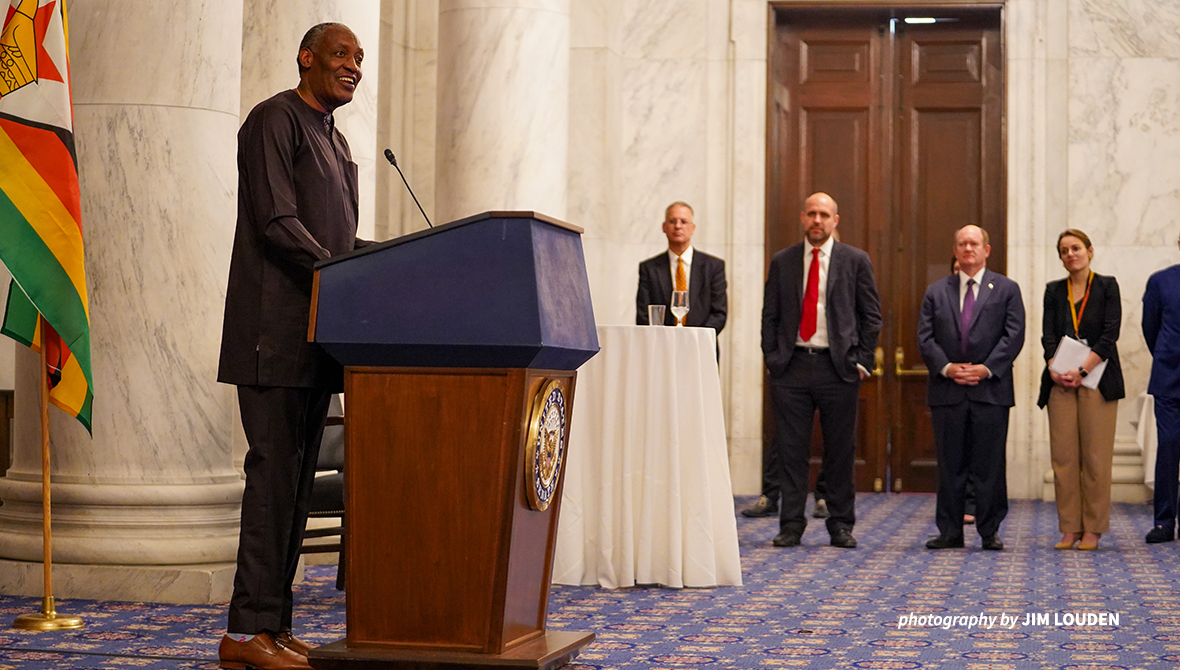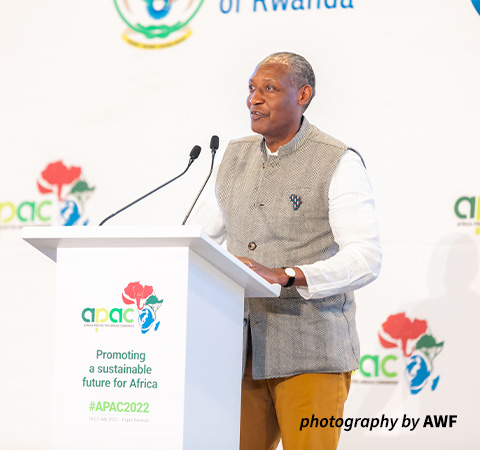A ray of hope at the US-Africa Leaders Summit?

AWF CEO Kaddu Sebunya gave a speech at the U.S.-Africa Leaders Summit in Washington, D.C.
The Biden administration will have the chance to show that the U.S. is prepared to develop true partnerships and make real investments in its relations with African nations during the U.S.-Africa Leaders Summit, which is set for 13-15th December 2022. African leaders have frequently participated in such summits that have been hosted by the U.S., France, and other nations. The outcomes of most of these summits have been wanting, especially on the follow-through. When ambitious talk is not backed up by effective action, change remains a distant dream.
Especially coming off the heels of three major policy conventions — United Nations Framework Convention on Climate Change, the 27th Conference of the Parties, UNFCCC COP 27; the Convention on International Trade in Endangered Species of Wild Fauna and Flora, CITES COP 19; and the Convention on Biological Diversity, CBD COP 15 — one cannot assume that leaders will certainly follow up their discussions with action.
But there could be hope for concrete action if this summit is done differently. Notably, the Biden administration has made significant commitments, considering the relatively new U.S. Strategy Towards Sub-Saharan Africa.
Conservation is a development agenda, especially for Africa. There is no separation of the two. Africa’s natural capital underpins the development aspirations set out in Agenda 2063 and contributes significantly to global goals for addressing climate change, biodiversity loss, and desertification. The integral role of conservation in Africa should be a priority focus during the summit as it greatly impacts the future of Africa and the world.
The sooner global strategies incorporate Africa’s vital role in wider global development agenda, the easier it will be to consolidate our efforts toward a common goal. Achieving global targets is impossible if Africa is not factored in.
As a rapidly developing continent, it is imperative that Africa urgently reconsiders how growth is defined, mapped, and planned. Africa must prioritize development that mitigates climate and biodiversity threats, putting people at the core.
Cognizant of this, for the first time — ever — in July of this year, Africa met to discuss the role of the continent’s protected areas in conserving nature, delivering vital life-supporting ecosystem services, and promoting sustainable development.
The IUCN Africa Protected Areas Congress that was held in Kigali, Rwanda, played host to more than 8,000 people, including 3,000 in person and 5,000 virtually. Those numbers represent Indigenous peoples and local community members, business, government, NGOs, and youth — over 200 African youth from 24 countries.

AWF CEO Kaddu Sebunya at the Africa Protected Areas Congress in July 2022.
This Congress, which represented 53 African nations, captured one voice and a common agenda on conservation through the Kigali Call to Action.
The Kigali Call to Action details a vision of conservation on the continent around four pillars: Valuing biodiversity and ecosystems for the well-being of people and sustainable development in Africa; Respecting the rights of indigenous peoples and local communities to land and natural resources; Increasing investment in conservation to close the biodiversity funding gap and the creation of scalable solutions that promote integration and synergies between biodiversity, climate, peace; and — what we know will be sharply increasing — the development needs of people.
The 6 million square kilometers of Africa’s protected and conserved areas under discussion at the Congress — an area the size of Australia — are a global asset. They are Africa’s responsibility to manage, but they provide services for the entire world.
Biden’s administration must fully leverage this African conservation agenda, which in many ways dovetails with the U.S. agenda, in the new strategy to support conservation, climate adaptation, and just energy transition. Successful partnerships with the continent will be those that genuinely connect with African realities, priorities, and aspirations.
The summit — and the U.S.’s Strategy Towards Sub-Saharan Africa — are timely instruments to shape and deliver such partnerships to elevate capabilities and investments for conservation, climate action, technology innovation, cybersecurity, and One Health. This will super-charge both job creation for the soon-to-be world’s largest labor force and economic growth to better the lives of Africans and meet U.S. priorities in security, democracy, and other geopolitical interests.
Out of this summit, we are looking forward to seeing new legislation in favor of conservation, promising and practical funding mechanisms and opportunities, and, most importantly, proper streamlining and integration of conservation into other major economic sectors for posterity.
We are equally hopeful that U.S. policy toward the continent will begin to mainly see Africa as an equal partner, in line with what African countries have to offer, alongside their development needs and aspirations.
The leaders attending the U.S.-Africa Leaders Summit have the potential to shape and support these decisions in ways that protect a natural heritage upon which African nations and the global community depend, and to do it in a way that ensures these efforts are locally led.
And acting on that potential could not be more urgent — because I have no doubt we are at a tipping point.
This summit offers the U.S. leadership an excellent chance to demonstrate its sincerity and desire to aid developing African nations. It is a moment to seize the golden opportunity to work together and make a difference for the benefit of all.
If the U.S.-Africa Leaders Summit and the most recent U.S. Strategy Towards Sub-Saharan Africa are successful in resetting relations with the continent, that success will ultimately depend on definitive deeds rather than words.